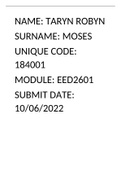Other
THIS ASSINGMENT IS VERY EASY YOU JUST HAVE TO READ I GOT 96% FOR THE WHOLE MODULE EXAM INCLUDED. PASSED WITH A DISTINCTION
- Institution
- University Of South Africa (Unisa)
THIS ASSINGMENT IS VERY EASY YOU JUST HAVE TO READ I GOT 96% FOR THE WHOLE MODULE EXAM INCLUDED. PASSED WITH A DISTINCTION
[Show more]




